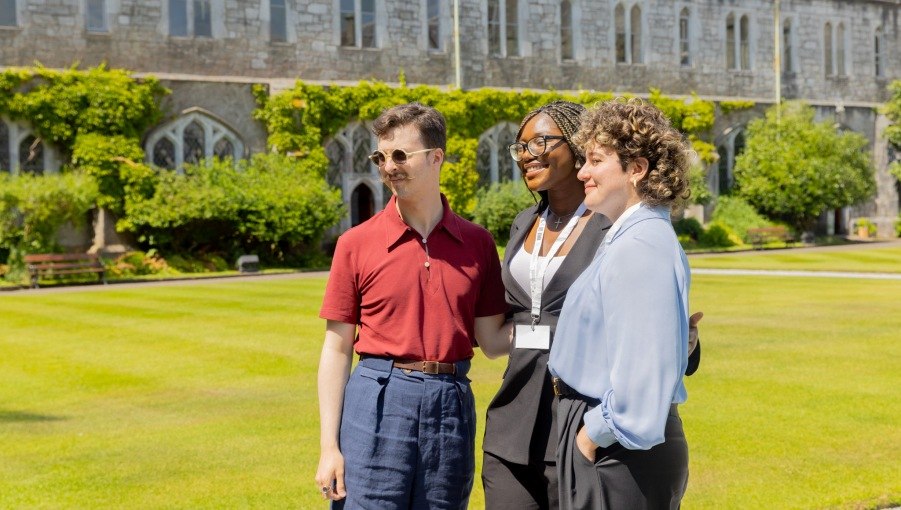The Challenges of Democracy Today: Valeria Di Muzio
Born in Rome, Valeria Di Muzio is majoring in Marketing with a double minor in Communications and Economics. She is currently the president of the Chinese Culture Club, the treasurer for the newly-founded Fandom Club, and a sub-editor for the Matthew. Last September, Valeria was selected to participate in the New York Times Athens Democracy Forum, hosted by the American College of Greece and in collaboration with the Global Liberal Arts Alliance (GLAA), of which JCU is an active member.
What are the benefits of studying marketing in this day and age?
Marketing fascinates me because of the infinite possibilities for innovation and its application to real life. An example is the job interview, where you “market” yourself to appeal to your future employer. The more I study marketing, the more I become interested in the role of media in marketing, and in the economic models behind consumers’ choices. Marketing would not be able to exist without a good communication system to rely on: one example is advertising. Economics, in my opinion, is the other side of the metaphorical coin representing marketing. Understanding the law of supply and demand for your company’s product is crucial in deciding which pricing strategy to apply.
What is your career goal?
I would love to be part of a PR team, in either a non-profit environment or in entertainment.
Tell us a bit about your involvement with clubs.
The Chinese Culture Club was founded in Spring 2016, and since then all the members have worked hard to show different facets of Chinese culture. There are many students who are interested in China, both for business and leisure, and it is important to encourage them to be curious and ask questions. As for me, I fell in love in with Chinese culture in high school, when I went to study abroad for a year in the city of Harbin in northeastern China, known for its bitterly cold winters. I think that learning more about a country that has become so powerful and relevant to our everyday lives is a must.
Fandom is a new club that aims to bring together people who share a passion for TV series, books, movies, and any other media products. The club wishes to encourage a critical media-based analysis and debate. For instance, on the 6th of October, the club organized a day trip to Romics, the Rome comics convention, as an opportunity to have fun while learning about comics culture and new media technologies.
You recently participated in the “Athens Democracy Forum,” as a student delegate. Can you tell us more about the forum and your experience there?
The Athens Democracy Forum, launched by the New York Times 5 years ago, brings together politicians, policymakers, journalists, scholars, and experts in a variety of fields to discuss the challenges to liberal democracy and possible solutions. One main issue democracies around the world are facing today, is the decreasing faith in its institutions, especially among the younger population. This trend does not affect all democracies in the same way, however. In India, for example, the majority of the population is composed of young people, the loss of faith in democratic institutions is distributed equally across younger and older generations.
I’m honored to have been able to represent John Cabot at such an event. I was greatly inspired by the dialogue taking place at the Forum, where the speakers and guests were business leaders, renowned professors, ambassadors, journalists, and human rights activists. As students, we were able to participate in a panel about the future of democracy and the generation gap. During the last day, we recorded the conversation on two of the UN’s sustainable goals, climate change and the plan to reduce social inequalities. We are currently writing a whitepaper for the New York Times that sums up the key points discussed in the Forum, namely, education, intellectual humility, and international cooperation, and how strategies applied in these fields could promote or damage democratic institutions. One thing that emerged was that a continuous dialogue between the younger and the older generation should be encouraged, especially at events like this, in order to take action and solve global and local issues together.
Tell us about your application essay.
I discussed the Italian phenomenon of “brain drain,” a consequence of globalization on youth. Italians, nowadays, encourage their kids to study English abroad more than ever before, partly because of the belief that there are better opportunities for young people in other countries. Through public funding of cultural activities, as I proposed in my application, perhaps Italy could create incentives for staying, and at the same time, offer job opportunities for youth. This would result in a positive reshaping of the country’s image on both a global and a local scale.
What is your main takeaway from the Forum?
The composition of our group of student delegates. It was remarked by our group’s mentor that he was comforted by the diversity and unity of our group. We were all able to get to know each other better, and debating delicate issues such as politics helped us to create more solid bonds.
Moreover, the issues discussed at the Forum were often left as theories, and there was not enough time to seek a practical solution for them. From our student group perspective, however, this inspired us to do more in our own local communities, to encourage whatever small change we can elicit.






